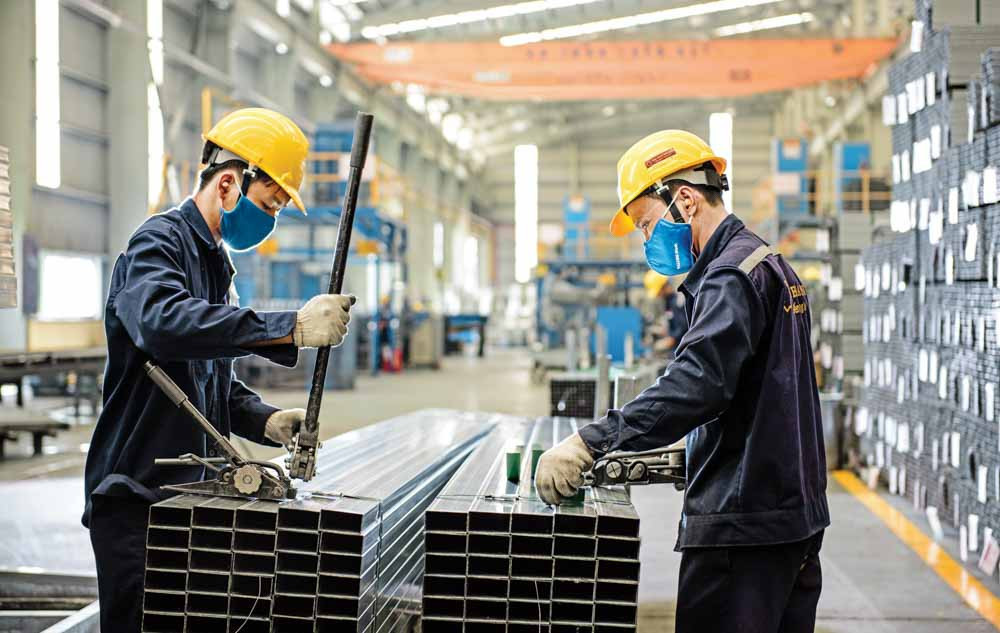
According to the Vietnam Steel Association (VSA), in the first five months of 2023, steel imports to Vietnam reached 5 million tons, of which 2.65 million tons were from China, which accounted for 52 percent of total imports. In March alone, imports from China soared by 146 percent compared with March 2022.
Meanwhile, the General Department of Customs (GDC) reported that in 2022, Vietnam imported 11.679 million tons of steel finished products, worth $11.92 billion.
The steel demand is yet to recover as the housing market in China has not warmed up and the number of newly built houses is on the decrease. Exporting steel is a solution for China to ease the inventories. Chinese exports of excessive steel are expected to increase in 2023, which would be a threat to Vietnam’s steel industry.
Meanwhile, nearly all steel products imported to Vietnam bear zero percent tariff (except for reinforced concrete). Moreover, trade remedies have been removed; other steel products such as galvanized steel sheet, colored steel sheet, steel pipe, and prestressed steel are not subject to any trade remedies.
A steel manufacturer estimated that the massive steel imports may cause 40,000 Vietnamese workers to lose jobs. Billions of dollars are spent every year to import steel products, while domestic products remain unsold.
Vietnam’s ceramic tiles are also threatened by imports. Analysts have voiced concern that the domestic market may fall into the hands of Indian manufacturers who offer low-cost products with unstable quality.
The 2022 import-export report of the Ministry of Industry and Trade (MOIT) shows the pressure that Vietnamese products bear from foreign imports. Vietnam spends tens of billion dollars on imports, from industrial to agricultural products.
Technical barriers lacking
Tran Tuan Dai, deputy chair and deputy CEO of AMY GRUPO, said Vietnam needs to install technical barriers in order to control the quality of imports, but barriers are too simple. Whole consignments can be imported if sample products meet requirements.
Therefore, the association of ceramic tile manufacturers stressed that it is necessary to set up technical barriers in accordance with international practice to prevent low-quality imports, protect the domestic market, and protect consumer rights.
Cashew nut producers have also shouted for help as they have faced difficulties because of massive imports.
Previously, Vietnam exported cashew nuts to India. But in order to protect domestic production, India has imposed a high 25 percent tax on imports. As a result, Vietnam cannot export cashew nuts to the market anymore. Vietnam has not taken any action to protect domestic production.
The cashew association has called for a 25 percent tax on imports to prevent damage to Vietnam’s cashew industry.
New rules of the game
More recently, the Vietnam Livestock Association has proposed that the government issue legal documents prohibiting the import of meat products from countries allowing farmers to use growth stimulants (Ractopamine, Cysteamine) in farming.
It has also urged ministries and branches to immediately apply non-tariff measures to protect production and consumers’ health, including technical barriers in accordance with international practice.
A representative of a steel group said it is unfair if other countries have technical barriers and trade remedies to protect their domestic production, while Vietnam does not.
Technical barriers are being applied in Thailand, Indonesia, Malaysia, South Korea and India. The products exported to the countries must show the certificates on complying with quality regulations of import countries. The certificate requirement aims at preventing low-quality imports and strengthening the control over steel imports.
Therefore, steel manufacturers have asked the government and MOIT to require exporters to prove their products can meet Vietnam’s requirements on quality, and apply reasonable trade remedies.
Under the current regulations, steel is not a product of group 2 which may cause unsafety; therefore, importers just need to declare the applied standards. But for other countries, steel is the product that needs strict control.
Minister of Industry and Trade Nguyen Hong Dien also said at a recent conference that big countries are tending to heighten their technical barriers, such as energy transition, low-carbon production and global minimum tax.
Luong Bang